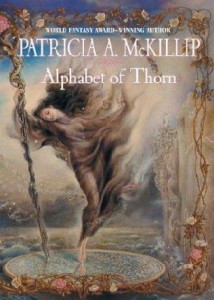 His name was Daimon. Nepenthe had known him all her life, for he had found her and named her. Of the child she had been before she became Nepenthe, neither of them knew a thing. In sixteen years since then, she had changed beyond recognition, and he had not changed by a moment, being the same dispassionate, thin-haired wraith who had picked her up with his bony hands and tucked her into a book bag to add to the acquisitions of the royal library.
His name was Daimon. Nepenthe had known him all her life, for he had found her and named her. Of the child she had been before she became Nepenthe, neither of them knew a thing. In sixteen years since then, she had changed beyond recognition, and he had not changed by a moment, being the same dispassionate, thin-haired wraith who had picked her up with his bony hands and tucked her into a book bag to add to the acquisitions of the royal library.
They named her Nepenthe because they named all abandoned infants left on the threshhold of the royal library of the kingdom of Raine alphabetically. One of her friends, Laidley, was older than her. Another, Oriel, was the foundling after her. Well, what do you expect, after all, from librarians? Nepenthe had “drooled on words, talked at them, and tried to eat them until she learned to take them into her eyes instead of her mouth.” She grew up into a transcriptor, someone who works with ancient manuscripts written in dead languages and teases out their stories. At least, some of the manuscripts held stories. Some turned out to contain lists of trade goods for long-forgotten caravans.
So far, Nepenthe’s tale seems perfectly written to capture my attention: I’m a librarian myself, after all, and a gobbler of words since toddlerhood. It’s an odd, charming account, and somehow feels magical, even though there aren’t any real whisps of magic in it. Yet.
However, this is a novel by Patricia A. McKillip, fantasist extraordinaire, and so by page eleven the whisps of magic are gathering. Nepenthe is given an old book to decipher, which appears to be written in an alphabet designed to look like thorns. It fascinates her, and she hides it from everyone but two trusted friends, working on it at all hours, stealing time away from her other projects, entranced by the story that she’s untangling. When her friends suggest that her enthrallment isn’t healthy, is perhaps even magically-induced, she refuses to acknowledge their concern. Which, of course, in novels like these, is always a sign of true danger.
The book, as Nepenthe translates it, appears to contain the story of two friends, Axis and Kane. But it must be a made-up story, because Axis and Kane were a conqueror of Ghengis Khan stature and his faithful mage, who destroyed kingdoms so far back in history that their names are scarcely remembered. And as Nepenthe translates thisstory, it claims that Kane discovered a way for Axis to leap across time itself to conquer kingdoms centuries in his future. Which would be a fanciful and forgettable idea, except that as Nepenthe feverishly translates further and further, it appears that the next kingdom in Axis’ sights could be Raine itself.
Alphabet of Thorn is as odd and lovely as all of McKillip’s books are. And as convoluted. Nepenthe plays a large part, perhaps the largest, in this tale. But there are other characters who are just as intriguing as she, who come to find that they must do things that could change the world around them irrevocably. There’s Bourne, an apprentice magician who falls in love with Nepenthe, learns the secret of the book of thorns, and could help or hurt her. There’s Tessera, the newly-crowned queen of Raine, who flees from her duties in fear and misery. To the eyes of all at court, she has none of the skills she needs to make a strong queen. But could she have skills no one anticipated, skills that could stop an invader appearing magically from the past?
And then there are Axis and Kane themselves, who leap from the pages of the book of thorns as real people, with passions and fears of their own. Kane loves Axis with all her heart, and will give him anything he wants, even if she has to rip time to do it. What will she do when she discovers that Axis loves conquering more than he loves her?
The plots tangle, the people move together and apart. The kingdom of Raine grows up around Nepenthe, Bourne and Tessera, described in glowing, intricate detail the way only McKillip can do it. The world of Axis and Kane, hot and sultry, counterparts Raine’s misty forest and cold sea, creeping closer to it with every episode Nepenthe translates. There’s a mounting tension as the reader feels these two worlds moving closer and closer together, until their collision is inevitable.
The outcome is mysterious, but also prosaic in an odd way. McKillip excels at creating magical realities that are consistent, without any glitches or sentimentality. Often, her novels end like the oldest fairy tales and ballads, beautifully but strangely; the reader senses that “The End” is governed by magical rules, not by any human logic. In Alphabet of Thorn, there are magical happenings and resolutions, but the fate of the human characters is a human fate, familiar. Its familiarity is both comforting and unsettling. Perhaps that’s an even more powerful magic.
(Ace, 2004)
